Doselva & Gaia Herbs Partnership in Nicaragua
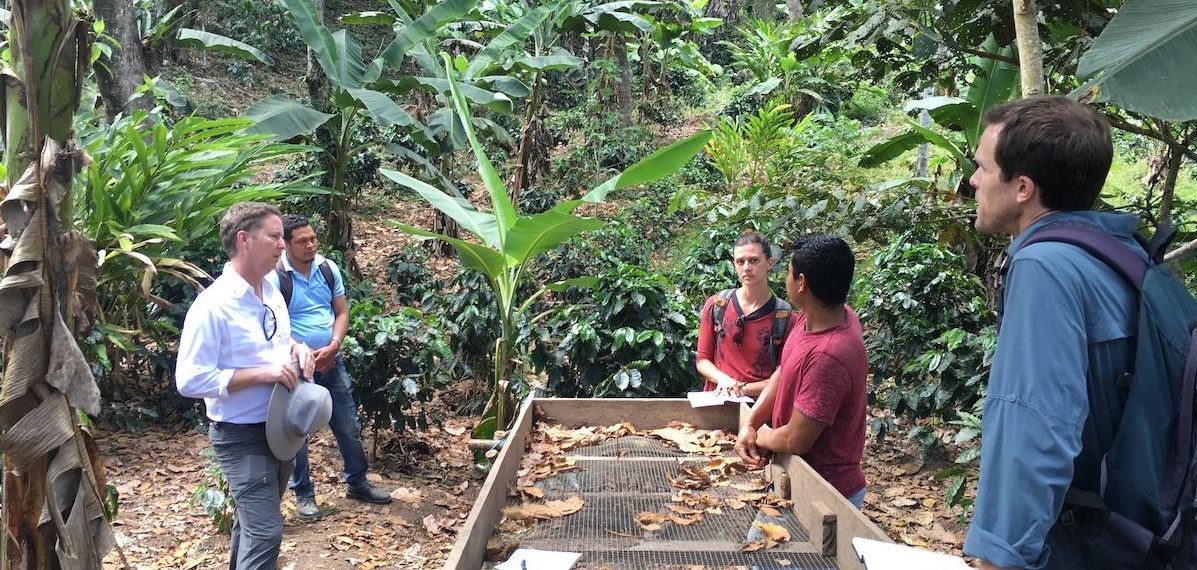
Producing Regeneratively Farmed Turmeric and Ginger
Sustainable Herbs Program Case Study Series #1
Rural Development through Turmeric and Ginger Farming in Nicaragua: A case study using the Community Capitals Framework
By Ann Armbrecht, SHP Director; Stephanie Kane, Global Sourcing Specialist, Gaia Herbs; and Jefferson Shriver, Co-Founder and CEO, Doselva.
Introduction
This Case Study uses the Community Capitals Framework (CCF), which looks at supporting community development through seven capitals. It is part of the Sustainable Herbs Program Learning Lab series. The purpose is to find a framework that captures the multi-dimensional nature of community life and the ways participating in the supply network of botanicals impacts that multi-dimensional context.
This first case study is presented as a prototype to begin framing these impacts. This case study is based on preliminary research and interviews with some but not all of the key stakeholders. The goal with these case studies is less to provide all of the details, especially since many of the initiatives are in early stages, and more to share examples of the different types of impacts that are important to assess the different types of partnerships that can lead to these impacts. SHP is sharing them to inspire further research, discussion, and action — particularly around addressing the unique challenges of addressing living income with farmers for whom that income is only part of a larger livelihood.
SHP Learning Lab Mission
The SHP Learning Lab is committed to pushing the boundaries of partnership in the botanical industry. Participants in the Learning Lab are committed to nurturing relationships based on trust, on telling the truth, on respect (for people, for plants, for the planet), and on cooperation.
Participants in the SHP Learning Lab are aligned in their commitment to growing companies that source high quality botanicals in ways that enhance biodiversity, support smallholder farmers and wild collector communities, and reduce carbon impact. And, the participants are committed to sharing resources and ideas, asking difficult questions, and exploring out-of-the-box solutions around the values of earthcare and ethical partnerships along the value chain.
These case studies are one way for SHP to explore the extent to which these values are being implemented in medicinal plant supply networks and the degree to which these activities are having an impact. These case studies are prototypes. SHP greatly appreciates any and all feedback from sector experts in order to improve and strengthen future applications of this evolving methodology.
Assumptions and Framework
Recent research on smallholder farms and living income shows that a well-performing agricultural sector is needed to create pathways out of poverty in rural communities but on its own, that is insufficient. Business and governments have central roles in advancing smallholder-based agricultural transformation.
Research by the Farmer Income Lab (Farmer Income Lab: Enable Smallholder based Agricultural Transformation) has found that traditional procurement practices by many businesses, typically designed to maximize short-term profits, are not only not improving farmer incomes, they are also increasing risk, depressing prices, and discouraging farmers from investing in their farms (Farmer Income Lab 2019a).
When smallholder farmers don’t have the resources to support a decent standard of living, they put off investments in their farm, use fewer or lower-quality inputs, and don’t invest in the efforts which buyers of their materials are seeking. This reduces the productivity of their land which keeps them trapped in this cycle. All of this in turn increases the difficulty of this work which may lead younger generations to leave the farms altogether (Farmer Income Lab 2021:7). And so these case studies focus specifically on ways businesses can support the development of vibrant rural economies in the communities where they source botanicals.
Methods
Attempts were made to keep the methods simple and direct attention to answering key questions – Why this project? What impacts has it had? What are the key steps the company took to initiate it? And what are some lessons learned?
Though there are many frameworks for approaching this work, SHP employed the Community Capitals Framework to help capture the multi-dimensional nature of community life.
Doselva and Gaia Partnership Overview
This case study looks at a sourcing partnership between Doselva, a farmer aggregator and processer/exporter of various botanicals based in Nicaragua, and Gaia Herbs, an herbal supplement manufacturer from Brevard, North Carolina. Gaia is interested in Doselva’s commitment to organic, regenerative agriculture and to supporting smallholder farmers to diversify in the face of a changing climate. The Sustainable Herbs Program, Gaia Herbs, and Doselva produced this case study to illustrate how they have worked across the supply chain to bring diversification and more stable income to these farming communities.
Doselva was founded in 2017 by Jefferson Shriver. The company works with around 300 Nicaraguan smallholder farmers to grow turmeric, ginger, vanilla, and cardamom and processes the raw material for export in Granada, Nicaragua.
Gaia Herbs was founded in 1987 with a commitment to purity, potency, and integrity in their sourcing and formulation of herbal supplements. Most of their manufacturing is done in-house on the site of their organic farm, residing on 350 acres near the Pisgah National Forest in North Carolina. Their best-selling line Turmeric Supreme® uses approximately 30-40 tons of turmeric per year, making it the largest quantity of herb they buy.
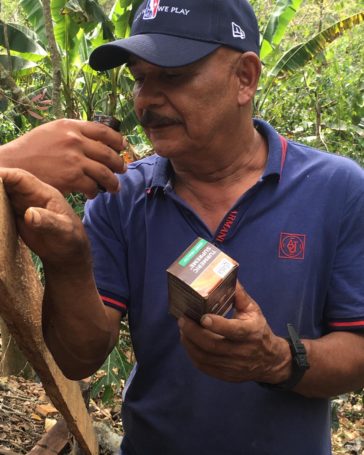
Doselva farmer looking at the Gaia Turmeric Supreme capsules made with turmeric he supplied.
“We Focused on Our Vision”
Gaia Herbs was introduced to Doselva in September 2019. The two companies quickly found that they shared a core set of values and a vision of the transformative nature of herbal farming. Gaia was launching their Global Farmer Investment Fund, which aims to support its farming network through investments in regenerative agriculture. In 2020, Gaia received its first order from Doselva’s network of turmeric farmers. That same year, Gaia issued an $8,000 grant for Doselva’s farmers and agricultural extension agents to cover planting, soil amendments, disease and pest management, and harvesting for turmeric production.
As Alison Czeczuga, Sustainability & Social Impact Manager at Gaia Herbs, said, “The grant was a great foundation for building trust at the beginning of our relationship. While we were qualifying them as a vendor, we were also having conversations about our values. Our conversations were easier and more transparent. From the outset we focused on the vision rather than just the transaction.”
In 2022, after several postponements due to COVID, members of the Gaia Herbs Global Sourcing Team, Stephanie Kane and Chase Millhollen, joined by Ann Armbrecht of SHP, visited Doselva for a week to meet with the farmers who grow their turmeric and to see Doselva’s operations first-hand. It also represented an opportunity for Gaia and Doselva to calibrate on product quality issues and good manufacturing practices.
Objectives of the Doselva and Gaia Partnership
Doselva’s vision is anchored on regenerative agriculture as a way of mitigating and adapting to climate change to create three outcomes:
- To protect Central American forests by creating a market for certified organic herbs and spices grown in an agroforestry setting;
- To help Central American farmers diversify their livelihoods and achieve a higher and more reliable income by diversifying their crops and working towards Fair Trade certification, and
- To produce the highest quality ingredients for Gaia (and other wholesale and finished product companies), directly traceable to hundreds of smallholder farmers.
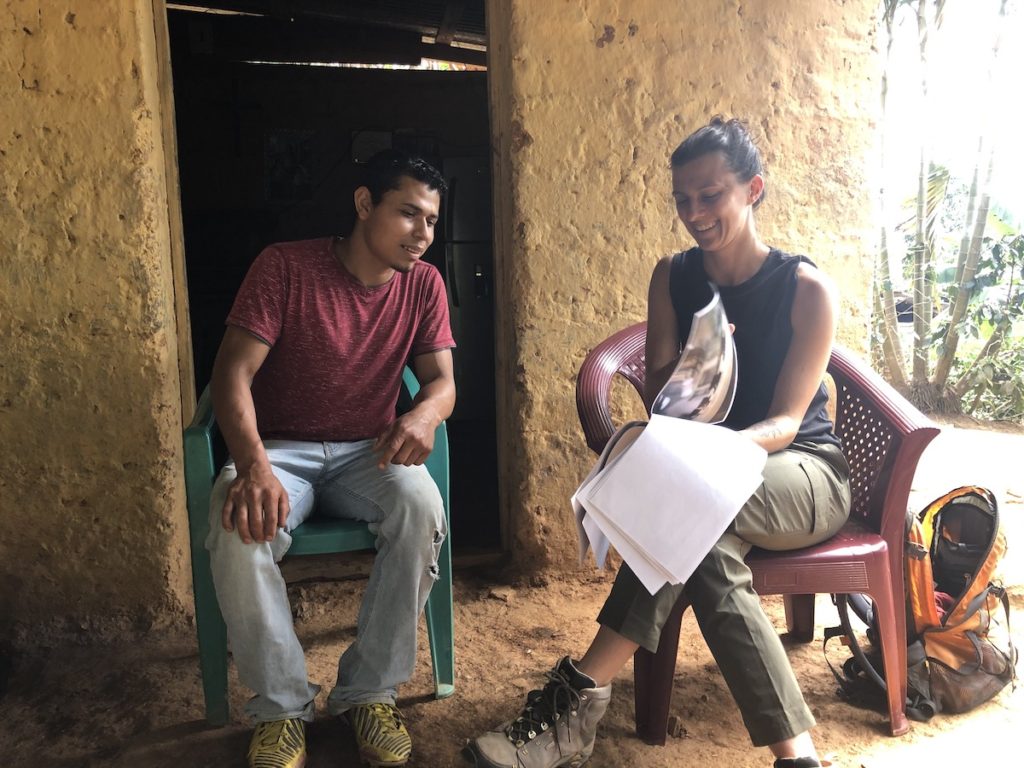
Farmer Nolvin and Stephanie Kane sharing photos of the Gaia production process by Chase Millhollen
Stakeholders
- Farmers – 300 Farmers total, 130 of those from coops. 170 independent farmers. The independent farmers are grouped together using a lead farmer approach, i.e., Doselva reaches out to the lead farmer who then gets others involved.
- Doselva – Develops farmer network, purchases spices from farmers, processes (washes, slices, and dries), and exports fresh and dry material.
- Gaia – A leading herbal supplement brand in North America, looking to source high quality material with a positive environmental and social impact.
- Consumers – Turmeric is one of the top-selling herbs on the United States and other international herb and dietary supplement markets. It is best known for supporting the anti-inflammatory response, supporting optimal joint health, mitigating the body’s response to pain, and encouraging healthy digestion. Consumer data show that traceability, safety, efficacy, and sustainability are all important factors when choosing a brand.
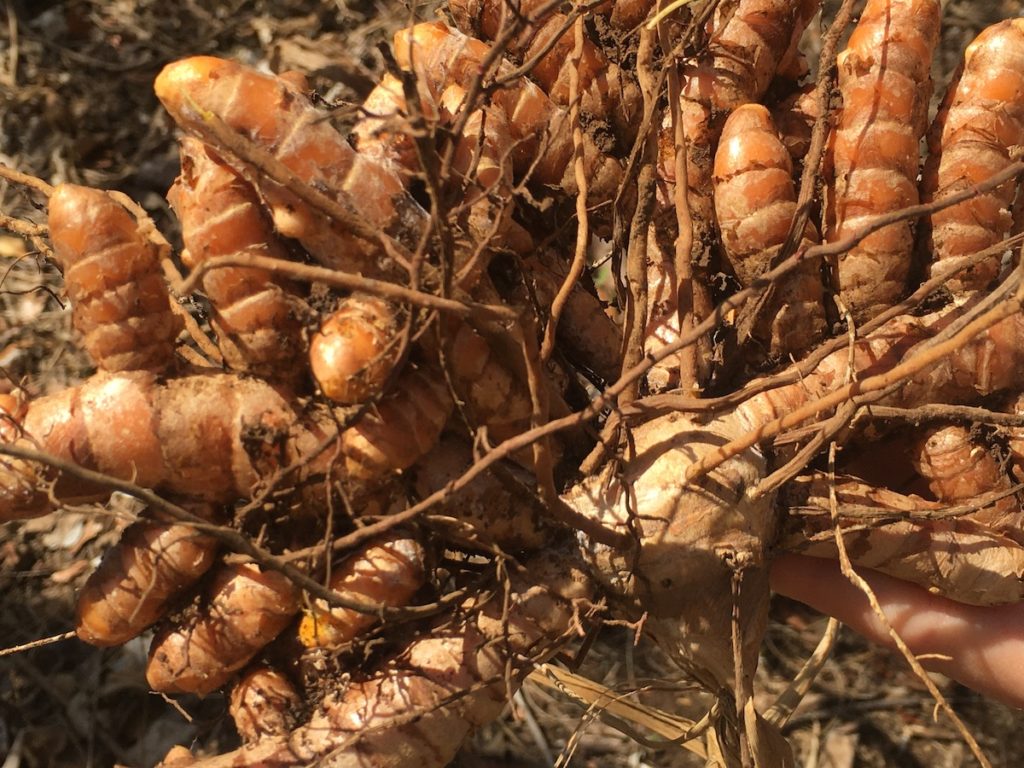
Turmeric rhizome grown for Doselva.
Value for coffee farmers to grow turmeric and ginger
- The production cycle is short for these plants: the period from planting to harvest is 8-10 months, in contrast to coffee which requires a three-year waiting period. With rain-fed systems there is one harvest per year, with irrigation up to two.
- Both rhizomes love the heat and can be grown at a wide range of altitudes, making both crops highly suitable alternatives to coffee in a changing climate.
- Both turmeric and ginger are shade-tolerant and can be intercropped with coffee (planted between rows) in an agroforestry system or in full sun compact systems. Once dry, they are shelf-stable for one year. Neither crop is highly vulnerable to pests or disease; production costs consist of seed purchase, planting, weeding, and harvesting.
- The harvest for turmeric starts after the coffee harvest ends, when there is typically little income. Perhaps most important to the farmer is that both turmeric and ginger put cash in the hands of farmers at a critical moment.
Business Vision
Doselva began by working with coffee farmers growing certified Fairtrade and organic coffee in polyculture agriculture systems, many of whom were in coops formed in the late 1990s (See Nicaragua Tierra Nueva – OECD [Organisation for Economic Co-operation and Development]). These coops are well established with several hundred members and have highly developed trade networks that export coffee and honey to Fairtrade markets in Europe and North America. Since they were established, the coops have offered training in everything from agroforestry practices to navigating international quality standards for export. Producers for Tierra Nueva COSATIN, a coop with 300 members, began to run trials of ginger and turmeric in 2013 and began exporting organic and FairTrade-certified turmeric and ginger to high value European and US-based companies.
The first phase of Doselva’s plan has been to develop a solid business plan and ensure it can provide high quality raw material at a price that can, in turn, enable Doselva to implement the second phase of its vision. This second stage is to use these markets for spices to improve the social, economic, and environmental conditions in the farming communities. During this next phase, the company will focus more directly on the community capital impacts outlined below. This case study thus offers a baseline to be used to compare and measure against in the future.
Processing Center
Doselva established a processing center to wash, cut, dry, and store this raw material on the outskirts of Granada, Nicaragua. Doselva is working on expanding into Honduras to diversify its supply networks and manage the company’s risk. When thinking about this expansion Jefferson and his business partners have a perspective that would probably be considered unique in the business world. They had considered expanding into Costa Rica, which according to Jefferson, would be a much safer business risk, because of the political, economic, and social infrastructure for international trade, although, as he said, “but the impact would be less. And I’m not doing this work to be safe. I’m doing it to change the world.”
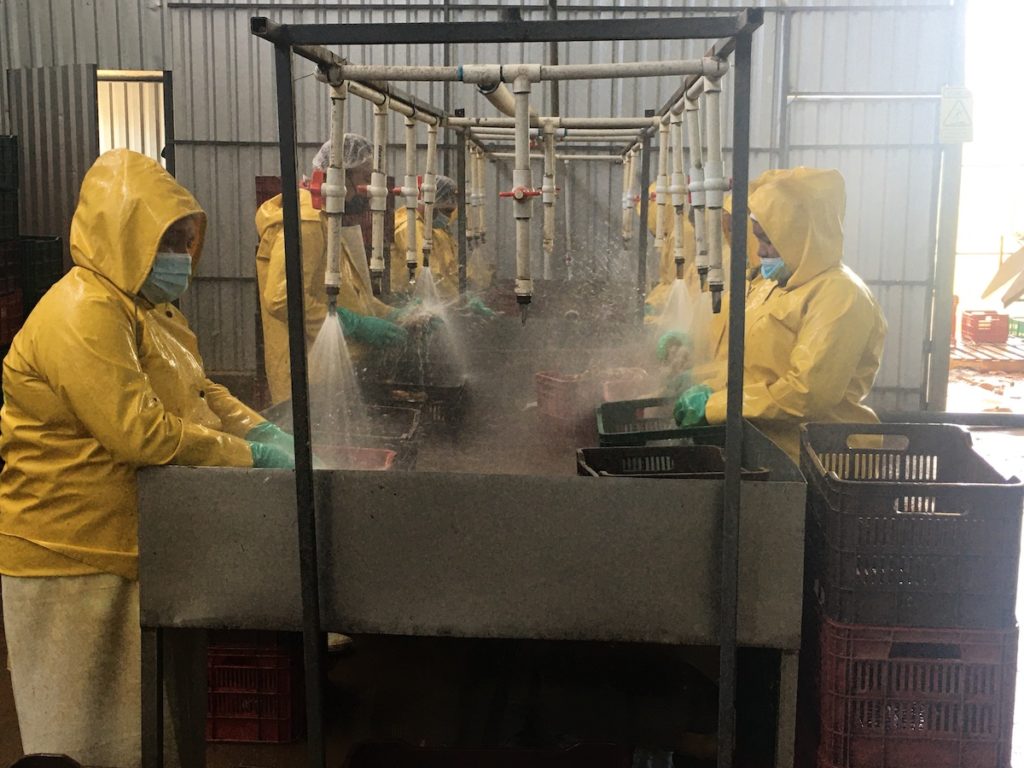
Washing fresh ginger roots at the Doselva processing center.
The success of this enterprise depends on Doselva’s ability to export the raw material at a price that supports these communities. To achieve this, the raw material must meet the high quality and traceability standards required by North American and European companies. Doselva also differentiates its product by demonstrating to its customers tangible social and environmental impacts on farmers and rural landscapes.
See more background on the coffee growing communities in Nicaragua and their interest in ginger and turmeric in this article by Jefferson Shriver.
Capacity
Doselva’s current annual production capacity is 140 metric tons of dried ginger and turmeric combined and 720 metric tons of fresh ginger and turmeric, with plans to double that volume into 2024. The company is beginning to make forays into growing and selling 50 metric tons of cardamon in 2023, and smaller volumes of lemongrass, vanilla, and hibiscus.
Gaia purchases 30-40 tons of turmeric annually, over 20% of Doselva’s dry volume. As Gaia continues to innovate with new products, having a solid ingredient partner gives the company the confidence to formulate with that herb. This partnership also gives further confidence to look at additional forms, like purchasing powdered turmeric from Doselva.
Terms of Trade
Doselva:
- Doselva provides a sales contract to farmers at the beginning of the year. Sales contracts are more common in the coffee industry. The coffee industry tends to lead other sectors in establishing more equitable trade terms. Companies recognize the need to meet farmers on their own terms to prevent the farmers fromselling coffee to other parties.
- Doselva provides the following services to the farmers: in-kind seed finance, organic inputs for farming practices, on-farm technical assistance in production and harvesting best practices, organization around harvest collection.
- Certifications: Doselva manages the participation of its farmer network in various third-party certification programs such as Organic and Global Gap. Certifications are a pre-requisite to formal market access, and boost supply chain actor confidence in adherence to food safety, social, and environmental standards. Farmers are less subject to price volatility in these markets and are more assured of year-on-year sales and a long-term partnership with Doselva.
Gaia:
- Gaia Herbs offers a pre-payment to Doselva for Doselva to be able to provide the farmers in their network an advanced payment to cover harvest costs. As a certified B Corp™ and a mission-driven business, Gaia Herbs recognizes that each supplier is working within unique conditions. Since Doselva’s network is comprised of small-holder farmers, advanced payment can enable farmers to help ensure a more stable cash flow at critical points in their production season when their costs are the highest. The result is a more secure source of supply all around, where farmers’ needs are anticipated and satisfied and Doselva receives the raw material when it requests it to meet its own production deadlines.
COMMUNITY CAPITALS
These definitions are taken from “Promoting Community Vitality and Sustainability,” by Lionel J. Beaulieu, Purdue University, October 2014.
NATURAL CAPITAL
The quality and quantity of natural and environmental resources existing in a community.
In Nicaragua, the forest is by and large the community’s strongest available Natural Capital. However, deforestation is an increasing concern. In Central America, initiatives that preserve the forests contribute to reducing greenhouse gas emissions and to protecting and enhancing biodiversity.
The farms are a mix of shade-grown coffee, banana trees, mango, avocado, sugar cane for erosion, some cardamom, a mix of hardwoods and turmeric. While touring the country in 2022, Jefferson said that the farmers around San Juan del Rio Coco have the best polyculture that he has seen in Nicaragua and maybe even in all of Central America.
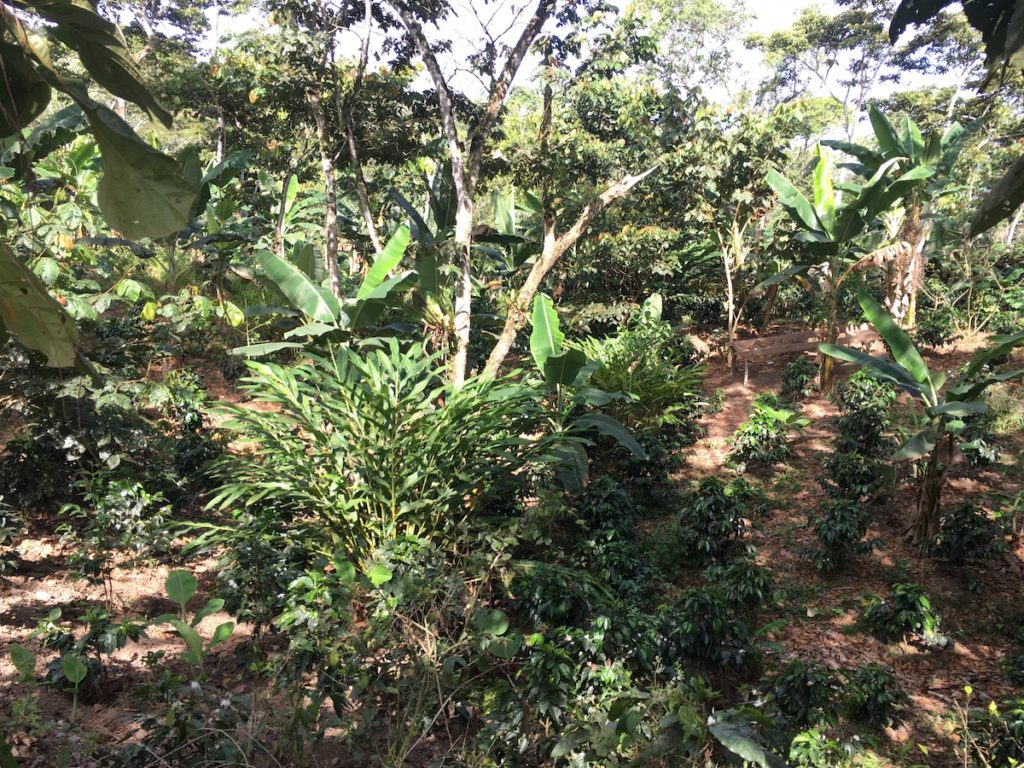
Coffee intercropped with turmeric and cardamom in the Doselva farmer network, Nicaragua.
Expanding Natural Capital
- Agroforestry – Turmeric is grown either under shade-grown coffee (which works when coffee is one or two years old, but as the coffee grows the two can compete for root space) or in fields surrounded by trees (typically citrus and/or bananas). The turmeric must be rotated after two or three years; rotation is done with maize and beans.
- Low Tech and Environmentally Safe Inputs – In 2022 Doselva supplied vermiculture, pigeon pea seeds, and foliar sprays for diseases to improve turmeric yields and the harvest/income for farmers.
- Reuse – Using the waste material (organic coffee cherry orcascara) from coffee production for building the soil.
- Organic farming – Because farming practices are certified organic, these practices keep synthetic chemical fertilizers and pesticides like glyphosate or ammonia from entering the ecosystem.
- Land Management – In a different region, Doselva is helping farmers develop sustainable stationary agriculture systems rather than slash-and-burn methods, through rotating crops and building the soil, not expanding into virgin land which offers short-term fertility.
- Water – Agroforestry practices help retain water at the farm level and minimize run offs and soil erosion. 100% of the farmers rely on rain-fed crops. Irrigation isn’t an option and so they need green water solutions, including using rainwater as much as possible, retaining the water in soil, and using cover crops.
- Water in Processing – Processing the harvested botanical material requires a significant amount of water. Doselva is working on developing good stewardship of water in processing by looking at ways to conserve water use by using available technologies including pressure from water jets to clean soil from the ginger & turmeric roots, rhizomes, immediate recircling of water, and some level of re-use where appropriate.
- Energy Use at Processing Facility– Doselva has a greenhouse for solar drying and is designing protected areas to take advantage of solar energy to decrease its energy use and carbonfootprint.
SOCIAL CAPITAL
“Social capital refers to the type of ‘glue’ that holds a community together and whose presence can spur the type of economic growth that brings benefits to the entire community.” This includes ‘bonding’ and ‘bridging’ activities within the community as well as connections that tie community members to organizations and resources outside the community. (Community Capitals Framework)
The farmers with whom Doselva works are well organized and connected to one another from their involvement in coffee cooperatives. While coffee is a huge industry, Doselva can strengthen the power of the co-ops by providing an additional Fair Trade crop, which will add to the premium paid directly to farmers and to the premium fund from Fair Trade. Fair Trade funds were used to open a restaurant in the mountain community of San Juan del Rio Coco, creating jobs for younger people in the city.
Doselva agricultural technicians travel to the farms to offer training and support, but the ratio of farmers to technicians is too high. Doselva is working to increase the number of technicians to provide better support. This will allow them to provide better post-harvest handling training, which they have found to be a top priority. By learning to properly sort the material in the field, the farmer will only send the best product. They know what they will be paid for and will have less material rejected after receipt. This in turn creates a true partnership with the farmers. It takes additional work on Doselva’s end, but in the end, it helps the farmers achieve a better livelihood. Doselva’s vision is to be a business that is anchored in the region, so offering this support makes Doselva more than being simply a buyer.
Social Capital
- Technical Support: Builds farmers’ knowledge which they can continue to share with others.
- Community Income Generation: By creating a new stream of income in the region, Doselva has an impact on making farms more viable and resilient, and this allows farmers to stay on the land rather than having to migrate for work. This is of global value.
- Loyalty: Advance payment to pay for labor helps develop farmer loyalty.
- Management Opportunities: The longstanding coffee industry in Nicaragua provides a basis for Doselva’s being able to start the company with experienced Nicaraguans in management at the company. This prevents brain drain by giving Nicaraguans opportunities at various levels of the company.
- Advanced Leadership: Doselva is working on bringing in more Nicaraguan representation into leadership at the company’s Board of Directors.
HUMAN CAPITAL
Attributes of individuals that provide them with the ability to earn a living, strengthen community, and otherwise contribute to community organizations, to their families, and to self-improvement. Human capital includes access to education/training, skill building, and leadership development.
Agroforestry Training Materials
With the Gaia grant, Doselva produced five technical manuals along with a series of videos used by its 8 agronomists to train farmers in regenerative practices with specific crop agroforestry systems. The manuals included technical manuals in turmeric, cardamom, vanilla, ginger, and agroforestry. Technical Advisor Osmar Centeno has been using the training materials for two years now with over fifty farmers in his region of Madriz in Northern Nicaragua. According to Centeno, the agroforestry system manual has been particularly helpful.
“The productive base of this area in the vast majority of crops are under agroforestry systems because coffee and other crops such as cocoa are grown. We have helped farmers to add turmeric and cardamom under these same agroclimatic conditions, and we can see that the plant suffers less water stress and a greater accumulation of microorganisms and nutrients available for crops. Farmers who do not have an agroforestry system in place have been provided with this manual, have been trained on its practices, and are now planting hardwood species and allspice trees as part of the shade canopy to improve production systems,” he explained.
The Technical Manuals
Technical Advisor Hugo Paz has been with Doselva since its founding. He visits the 75 farmers in his region weekly throughout the year. “The Turmeric Technical Manual is of utmost importance for us technical advisors,” he said, “because normally the technical assistance has been carried out individually where we arrive at the producer’s farm and talk about what has been done in the crop. We move to the turmeric plot and inspect the entire area to see if the producer is complying with all the recommendations and see carefully if there are no problems that may affect the crop.
In the plot we have a dialogue with the producer where different topics are discussed according to what was observed in the field, from soil preparation, manual weed control, seed selection, crop rotation, management and control of pests and diseases, application of organic inputs, establishment of turmeric under agroforestry systems, harvesting and collection.”
“With the help of The Cardamom Manual,” Paz continued, “We were able to establish cardamom areas from planting, guided by the manual, which covers topics such as crop establishment, climatic conditions, seeds to be used, and agroforestry system design, since our priority is to work with crops that are adapted to agroforestry. We also addressed with the manual as reference general issues of agronomic management such as weed management and crop nutrition, relevant crop pests, and their organic control. Another important point is the issue of harvesting as both technical advisors and producers involved were new to this issue. The manual guided me in each of the stage of cultivation and provided details on the state of maturation and forms of harvesting.”
Stakeholder Skill Development
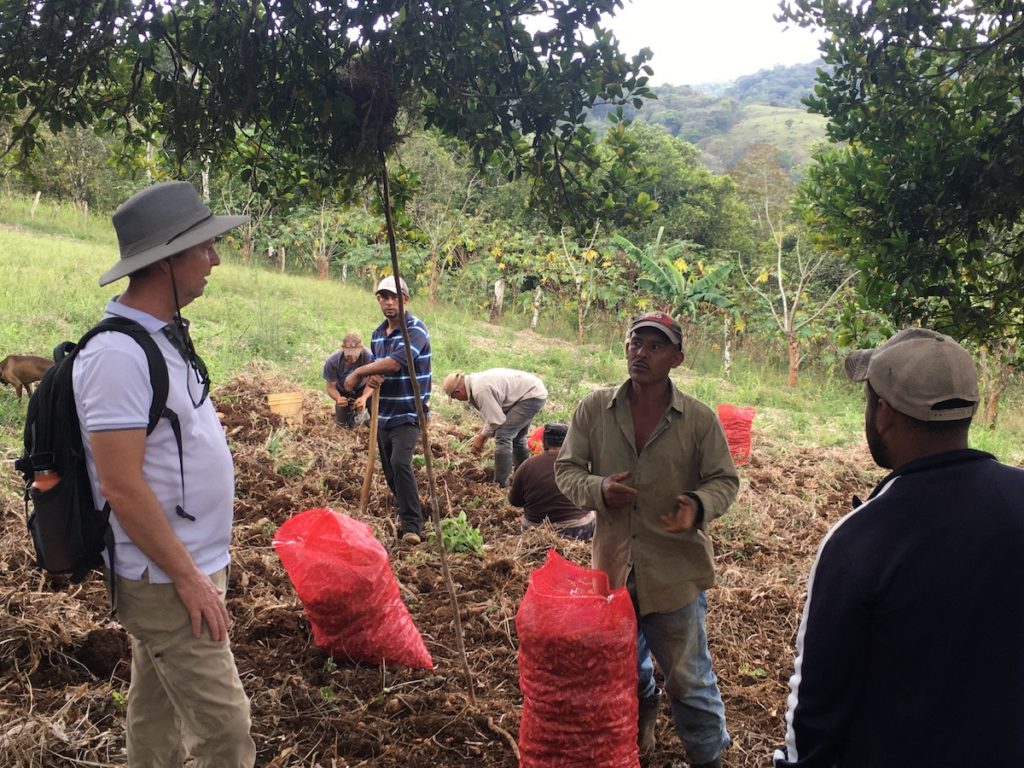
Jefferson in turmeric fields meeting with farmers.
Farmers
- Smallholders – Most of the farmers are considered smallholders, owning less than 10 hectares (24.71 acres; note: some the farmers visited as part of this case study were larger, some with 30 (74.13 acres) hectares, not considered small holders).
- Younger Farmers – Agricultural technician Hugo Paz works in the Boaco region where the average age of independent farmers in Boaco region is 22-35. He has a larger network of younger farmers because these farmers are more open to trying new things. Hugo works with smallholders who are growing ca. 1 acre. Many of them have now doubled the quantity of turmeric because of the income from growing turmeric.
- Gender Roles – Workers in turmeric production in the area are about 85% men, 15% women. Doselva recognizes that it is important to note and understand ways to support livelihoods for women in Nicaragua.
- Skill Development –
- Turmeric offers the opportunity for farmers to learn a new crop. Agricultural technicians provide outreach around agroforestry; much of this is building on the work done around coffee and agroforestry by the coffee coops.
- Farmers are required to document their farming practices in a workbook provided by Doselva. They tend not to do this on own, so Doselva agricultural technicians help them.
- Doselva is considering providing additional training for farmers around quality, by inviting them to the processing center to see next step of the process. and so they understand why attention to quality in the field is so important. By taking quality control staff from the processing facility to the fields, the QC staff are able to explain the quality requirements that are needed in the final stages directly to the farmers. Those staff would also learn about the farming practices for turmeric.
- Educational Opportunities – Farmers are using money from sales of turmeric to educate children and send them to universities
Each year more farmers are getting involved. “That’s a sign that there is an increase in income, which is an incentive for more to get involved.” Dennis, Coop Technician.
Doselva Processing Facility
The processing facility provides the biggest impact in terms of jobs and skills, including the following:
- Processing Plant – Skills with handling and processing new crops. Provided 38 jobs in 2022.
- Administrative – There were 29 administrative positions in the head office in 2022. Doselva offers positions that require higher education, which helps to encourage the community to seek this education.
- Skilled Labor – The areas of proficiency cover agronomy, traceability, quality, implementing and managing certifications, using/maintaining machines.
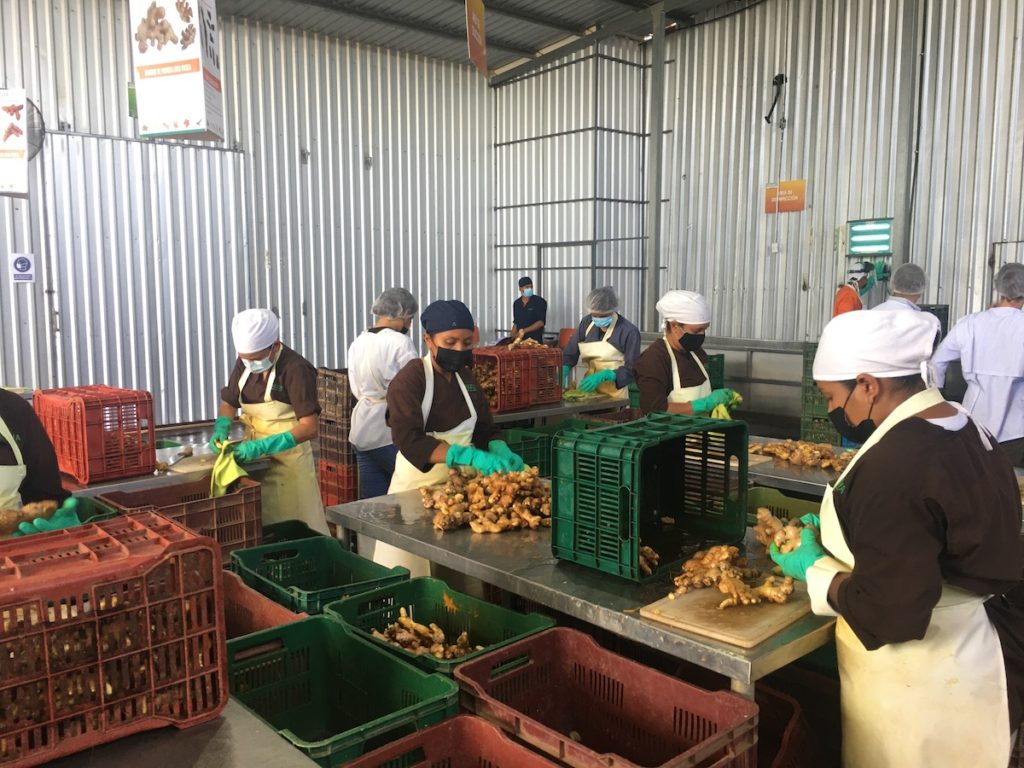
Women slicing fresh ginger roots at Doselva processing center, Nicaragua.
Agricultural Tech Staff
- Skills in implementing certifications: At present the agriculture technical staff teach and assist in Certified Organic and Global Gap agricultural certifications.
- Soft Skills: Working with farmers
- Deepening Education in Sustainable Farming: The ag tech staff members receive and provide regular training on agroforestry. regenerative and organic practices, disease management, and food safety.
Quality - Ag tech staffers are trained to navigate global quality standards and how to manage quality issues in the field and in the processing center (both quality and food safety).
Working with the farmers, the staffers train them and manage the certification process.
“A major concern is how to improve the farmer’s lives. The best way to do that is to improve farm production. That will give farmers more food security and better health. They are using the money to invest in better houses, food and nutrition, and education. To pay for children to go to universities for nursing and agronomy.” –Dennis, Coop, Agricultural Technician
Hugo Paz explained that farmers are hiring labor to harvest the turmeric. This is developing a microeconomy that is much more diverse than it was before. This is providing security for neighbors, family, and friends who may have less land in a different season. When money comes, it is distributed in the region and invested in the microeconomy, like corner stores and things like that.”
INDUSTRY ENGAGEMENT
With the ability for business operations to inspire change, this partnership has become the bedrock on what an ideal partnership at Gaia Herbs can look like. It is rooted in a shared vision of using herbal farming to improve the livelihoods of small-holder farmers as well as the tilth of the earth. As a certified B Corp™ and a mission-driven company that is in business to make the world a healthier place, Gaia Herbs has stated its deep commitment to stakeholder accountability and moving business into a new era of regenerative and responsible operations.
Gaia Herbs hopes that this partnership can not only serve as an example for its internal network of global suppliers and its desire to build more regenerative partnerships and programs, but also to inspire other companies to build systems that go beyond traditional transactional business operations and build operations that create shared value for all partners involved – brands, suppliers, and ultimately, consumers.
FINANCIAL CAPITAL
Financial capital refers to the financial resources available to invest in building capacity, development, entrepreneurship, and wealth accumulation.
Nicaragua is the second-poorest country in the Western Hemisphere and has the highest rate of deforestation of any country in the region. Growing turmeric and other spices in the understory alongside the stands of shade-grown coffee provides an additional economic incentive to keeping the forest canopy intact, offers additional income to smallholders, provides field jobs during the slow season for coffee, and helps coffee farmers diversify their farming practices to become more resilient in the changing environment.
Depending on the price for coffee, the income generated from growing turmeric can be comparable to coffee but, as one farmer said, “There is nothing stable about coffee, either the yield or the price.”
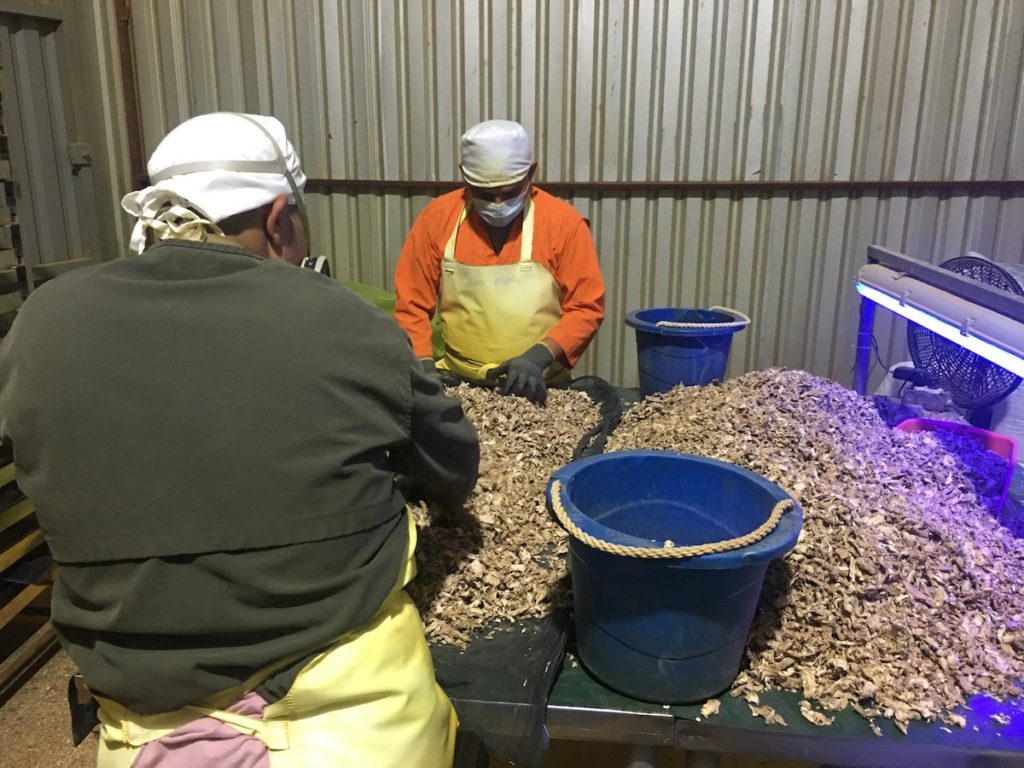
Cleaning ginger at the Doselva processing center.
Fair Trade Floor Price
All the farmers we visited grew Fair Trade-certified coffee. Fair Trade provides a floor price which helps when the price of coffee drops. Yet, that income isn’t enough to support the farmers the entire year and so they were interested in growing alternative crops that wouldn’t compete in space or time with coffee. More farmers are interested in growing turmeric each year, and current farmers keep adding more turmeric to their landscape, which means it is bringing in additional income. “Farmers will be the first ones to let us know if they are not making a profit,” Dennis, the agricultural extension agent for the cooperative in the region, said.
For the farmers, 50% of their cost is in the labor involved in growing. One of the ways Doselva and Gaia address the need for Financial Capital at the farmer level is through prepayment for goods. Gaia Herbs prepays Doselva when Gaia places its order, which Doselva in turn uses to pay to farmers 30-40% of the purchase price before the harvest. Doselva pays the remainder ten days after the raw material has been received at the processing center and passes quality testing.
At the farm level, farmers are seeing the potential for greater income. For one hectare of land, a farmer typically will get $2500/hectare (gross) from growing turmeric in the Doselva supply chain. Coffee typically brings in $800-1200/hectare, and beans, $150/300 per hectare. Each year more farmers are getting involved. “That’s a sign that there is an increase in income, which is an incentive for more to get involved,” said Dennis, Cooperative Technician.
Expanding Financial Capital
- Global Standards: Payment is made in US dollars and Doselva helps farmers set up bank accounts.
- Increasing Local Employment: Doselva works with farmers on the financial planning of production costs and profitability. Forty percent of farmers’ time is devoted to harvesting. Smaller land holders hire family, neighbors, and friends. Larger coffee farmers bring in labor from elsewhere.
- Local Investment: Farmers are using the additional income (1) to buy land which is expanding areas under organic and agroforestry practices, (2) for education, and (3) to improve houses.
- Stability: Price is more stable for turmeric than coffee. It’s not a race to the bottom for price. Doselva believes it is important to avoid the commodity price focus typical of coffee (and other crops) that leads to price instability. Turmeric sales provide money in the off-season, when there is not another source of income.
- Diversification: Hugo Paz, an agricultural technician, explained that “Farming is much more diverse than it was before. Turmeric is providing something in a different season.” Doselva’s vision is not only to diversify the cash crops so that farmers have two or three crops on which to build more financial stability and independence. They also plan to begin working with farmers to grow food staples: beans, maize, and millet to diversify their diet with what can be grown in smaller plots and possibly to grow some things in enough volume to generate additional cash from sales.
BUILT CAPITAL
The infrastructure that supports the community, including public utilities like water, sewer, and communication networks, roads, and industry.
There is a need for more investment in infrastructure in Nicaragua, including clean drinking water, sewer systems, and in more remote areas, roads. At the community scale, the built capital includes people’s homes, businesses, and farming equipment.
Expanding Built Capital
- Processing Facility: The investment in Doselva’s processing facility provides an asset to the community.
- Farmer Investment: Farmers use the income from turmeric to invest in better houses.
- Reduction of Energy Use: By building hoop houses for drying, Doselva is reducing the use of the electric-heated drying room which reduces their impact on the local energy grid. This also allows farmers to offer a higher quality material that was not dried directly in the sun.
- Upgraded machinery: Upgraded turmeric slicer for safety and to improve efficiency during Gaia Herbs extraction process and further down the supply chain.
- Water improvement project: Doselva’s processing creates a lot of wastewater in the cleaning of the turmeric rhizomes. To reduce the impact on the local water supply, farmers are undertaking a project to recycle this water into local crop production.
CULTURAL
Cultural capital is the community’s heritage and traditions, including the values, norms and beliefs that people inherit from their family, school, and community. This also includes cultural events, music, libraries, museums, and other expressions of their culture.
The culture of farming in Nicaragua is deeply imbedded in the coffee industry. During our conversations with young farmers, they all referenced the experience that was handed down by their families.
The last farmer we met with on our trip, Nolvin, was 25. We asked why he stayed and farmed when his siblings had immigrated to the U.S. He seemed a little puzzled at first and explained that he couldn’t imagine leaving, describing his love for the country, the animals, and plants, and his desire to take care of his parents. “Farming is fun,” Nolvin said, expressing his desire to be outside all day and to be learning something new.
Stephanie Kane was struck by how one farmer described how his neighbor used turmeric for her ailments, and how he was starting to drink it as tea and include it in his rice dishes. “It is no small thing to note that this is how food cultures change and evolve over time. What influence this will have is unknown and may take many years or decades to be seen. Every culture has its food traditions; some are ancient and some are quite modern, and the introduction of a new crop can influence this,” Kane said.
Expanding Cultural Capital
Gaia: This partnership impacts and supports the Gaia culture, and their mission of connecting people, plants, and planet to create healing. For employees, seeing this type of partnership ensures that Gaia Herbs is living into its mission and values. It sets a high bar of both procuring high quality herbal material, as well as creating high quality partnerships that are mutually beneficial.
Consumers: Consumers are looking for more than just products these days. Price and quality are as important as ever, but consumers also want to know that they are investing in products that are doing good for the planet. With more scrutiny around potential greenwashing, consumers want transparency into how a company operates – including from whom it sources, how those people are treated, and how a company walks their talk. Partnerships like this can give consumers confidence that they are purchasing products that have integrity behind them, and that through purchasing Gaia’s turmeric products, they are not only improving their own health, but they are enabling farmers to improve their own standard of living by supporting regenerative farming operations.

Comments